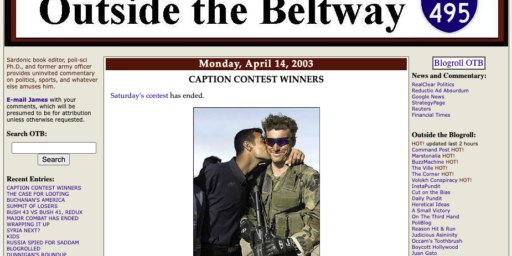Everyone’s a Beltway Insider Now
 Lee Gomes argues that the Internet has turned garden variety political junkies into virtual Beltway insiders.
Lee Gomes argues that the Internet has turned garden variety political junkies into virtual Beltway insiders.
While all good reporters have their own sources, they also share the same daily reading list. Most start with the big national papers, though you can skip those and head right for a site like Mr. Klein’s “the Note” at ABCNews.com and “First Read,” via MSNBC. NationalJournal.com is an obligatory stop by news junkies, and newsflashes are available at CNN’s Political Ticker. RealClearPolitics.com shows a list of what its editors consider to be the leading stories. You can also link there to the latest polls, or flip to similar information at pollster.com. Another aggregator of political news, memeorandum.com, uses a Google-style algorithm to determine the big political story of the hour.
There’s a lot to this. Indeed, there’s so many valuable sources these days that even the most obsessed can’t keep up with them all.
Gomes argues that there’s a big down side to all this: homogeneity.
For one, these sites are all devoted exclusively to the horse race; look elsewhere if you want to know what the candidates might do about the trade imbalance with China. Second, they tend to do to political conversation what chain restaurants do for food, making everyone, everywhere talk about things the same way. Jonathan Martin of politico.com, another site visited many times a day by insiders, says that political opinions have indeed been “nationalized,” though he gives equal credit/blame to the political discussion panels on cable TV.
Finally, the sites make it easy to lose perspective. Seeing a story sweep through a site like memeorandum.com, it might be difficult to resist joining the herd and its conventional wisdom. Indeed, some Web authors say they shut down their computers to give themselves a chance to think. “There is a value in crafting your post without having read what the cognoscenti have already written about it,” said Marc Ambinder, who is blogging the election for the Atlantic.
No doubt. On the other hand, getting multiple perspectives makes it easy to avoid leaping to wild conclusions based on the limited filters of one’s own experience.
Image via Beltway Blogroll
UPDATE: Kevin Drum takes the contrarian view: “[I]f everybody else is already writing about something, what’s the marginal value of one more opinion? Unless I have something genuinely new to say, pretty small.”






And, how much less homogenous was it when we had access only to the NYT, our hometown newspaper, and three/four news channels?
I’m not so sure, on this point. I mean, if the cadidates are talking about it, someone in the sphere is, too. Blogs, as I’ve said previously, are reactionary, in that they tend to work with what is available.